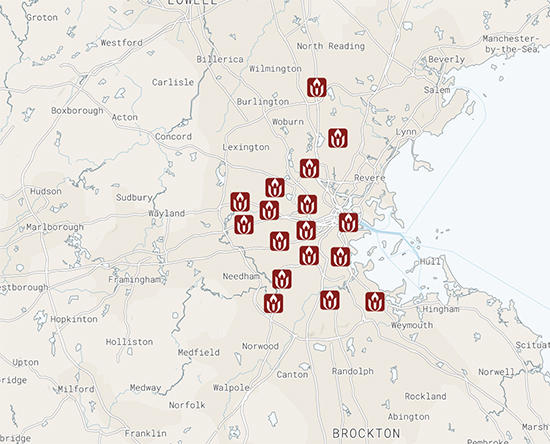Unitarian Universalism
Unitarian Universalism
Unitarian Universalism
Unitarian Universalism Timeline
Unitarian Universalism in the World (text)
184 - 253 CE Life of Origen of Alexandria
In his theological treatises, early Christian theologian Origen of Alexandria argues all souls will eventually convene with God.
325 CE The Council of Nicaea
Facing a record of non-Trinitarian theological writings that stretches back to the time of Jesus Christ, the Council of Nicaea declares non-Trinitarian theology heretical.
1533 CE Execution of Michael Servetus
Captured in Geneva, the Spanish theologian Michael Servetus is executed for spreading non-Trinitarianism. In an execution encouraged by John Calvin, Servetus is burned on a pile of his own books.
1568 CE Edict of Torda
John II Sigismund Zápolya, ruler of the Kingdom of Hungary, decrees religious freedom for certain Christian denominations, including Unitarian. Believing that Trinitarianism was not biblically sanctioned, King John II becomes the first and only Unitarian king. The Edict of Torda also recognizes the Unitarian Church of Transylvania, led by preacher Ferenc Dávid. After King John II dies, his policies of religious toleration are reversed, and Ferenc Dávid is imprisoned until his death.
1649 CE Digger Colony Founded in Surrey
Philosopher and activist Gerrard Winstanley, who believes in universal salvation, forms a commune on vacant land in protest of private property.
1689 CE Toleration Act
In England, the Toleration Act grants religious freedom to “nonconformist” Christians like Baptists and Congregationalists, but excludes believers in unitarian theology. In 1648, adhering to unitarian beliefs had been declared a capital offense.
1694 CE Philadelphian Society Founded
Mystic Jane Lead’s ideas help found the Philadelphian Society in England, which teaches about universal salvation and that God is present everywhere.
1774 CE Founding of the Unitarian Church in England
The Unitarian Church becomes a distinct denomination in England when preacher Theophilus Lindsey founds the Essex Street Chapel.
1995 Founding of the International Council of Unitarian and Universalists
The International Council of Unitarian and Universalists is created to unite Unitarian, Universalist, and Unitarian Universalist congregations and organizations around the world.
Unitarian Universalism in America (text)
1779 first Universalist congregation in North America founded
Universalist preacher John Murray founds the first Universalist congregation in North America in 1774 in Gloucester, Massachusetts. Amid controversy over his Universalist beliefs, George Washington appointed Murray as a chaplain during the Revolutionary War. Sometimes called the father of Universalism in the United States, Murray both represents and encouraged a shift among New England’s ministers towards Universalism during the Revolutionary War period.
1785 King’s Chapel becomes Unitarian
Located in what is now downtown Boston, King’s Chapel edits the Anglican Book of Common Prayer, dispensing with all Trinitarian language. With these amendments, King’s Chapel becomes the first church in the United States to openly embrace Unitarianism.
1803 William Ellery Channing becomes minister of Federal Street Church
William Ellery Channing, who would later become one of the most important preachers in Unitarian history in the United States, begins preaching at Federal Street Church, which would later move to Back Bay and become Arlington Street Church.
1805 Harvard appoints first openly Unitarian faculty member
Theologian and preacher Henry Ware is appointed as Hollis Professor of Divinity at Harvard University, the oldest endowed chair in the United States. Ware’s appointment signaled a shift in academic and theological acceptance of more liberal theology and a shift away from Calvinism.
1819 William Ellery Channing gives his “Baltimore Sermon”
Prominent preacher and theologian William Ellery Channing gives his Baltimore Sermon, during which he directly challenges those who call Unitarianism unorthodox. Channing argued against Trinitarian theology, proposed that Jesus Christ was human, and argued that Christ had not died to save humankind from its sins. Channing’s address sparked backlash that helped to fuel and consolidate the Unitarian movement.
1825 Founding of the American Unitarian Association
Following a schism between Congregationalist churches who affirmed or disaffirmed unitarian doctrine, the American Unitarian Association is formed.
1826 Benevolent Fraternity founded
Unitarian minister Joseph Tuckerman forms the Benevolent Fraternity to minister to the poor in Boston. Today, his legacy continues through the Unitarian Universalist Urban Ministry.
1838 Ralph Waldo Emerson delivers the “Divinity School Address”
At Harvard Divinity School, which had become a Unitarian hub, Ralph Waldo Emerson delivers his controversial “Divinity School Address,” in which he dismissed the need to believe in Jesus’ miracles and layed down the foundation for the Transcendentalist movement.
1848 Unitarian Church hosts Rochester Women’s Rights Convention
Two weeks after the Seneca Falls Convention, the First Unitarian Church of Rochester in New York hosts the Rochester Women’s Rights Convention.
1853 Ordination of Antoinette Brown Blackwell
Ordained by an independent congregation, Antoinette Brown Blackwell becomes the first woman ordained in the United States. In 1878, she became a Unitarian.
1860-63 Ordination of Lydia Jenkins and Olympia Brown
The Universalist denomination ordains Lydia Jenkins (1860) and Olympia Brown (1863), some of the first women to be ordained with the consent of their denomination.
1887 Unitarian movement begins in Khasi Hills, India
In what will become northeast India, Hajom Kissor Singh begins a Unitarian movement. Today, there are around 10,000 Unitarians in the Khasi Hills region.
1933 Humanist Manifesto Published
Unitarian minister Raymond Bragg and 34 co-signers publish a document describing humanist thought. Today, Humanism is the most popular theological strand within Unitarian Universalism. (See Humanism timeline)
1940 Unitarian Service Committee founded
In 1939, American Unitarians Martha and Waitstill Sharp travel to Prague to assist refugees fleeing the Nazi regime. Their work inspired the creation of the Unitarian Service Committee (now known as the Unitarian Universalist Service Committee) in 1940.
1946 UCA application to Federal Council of Churches rejected
For the second time, the Unitarian Church of America applies to join the Federal Council of Churches and is rejected.
1951 Universalist Movement begins in the Philippines
Universalist minister Toribio Quimada begins correspondence with the Universalist Church in America, and ultimately he founds what will become the Unitarian Universalist Church of the Philippines.
1961 Unitarian Universalism Forms
The Universalist Church of America and the American Unitarian Association band together to form the Unitarian Universalist Association.
1965 Murders of James Reeb and Viola Liuzzo in Selma
In the same month, Unitarian Universalists James Reeb and Viola Liuzzo are both murdered by white supremacists for joining the Civil Rights Movement marches in Selma, Alabama. James Reeb had been serving as the minister of All Souls Church in Washington, D.C., and Viola Liuzzo had belonged to the First Unitarian Universalist Church of Detroit.
1968 Black Unitarian Universalist Caucus Gains Funds
The Black Unitarian Universalist Caucus, after forming the year prior, successfully convinces the Unitarian Universalist General Assembly to pledge one million dollars over a period of 4 years to fight racial injustice. However, the UUA board rejects the funding request, and the money is never fully paid.
1984 The UUA Votes to Endorse Homosexual Unions
Before marriage was legal for LGBTQ people, the UUA voted to endorse Unitarian Universalist ministers performing ceremonies of union between LGBTQ couples. With this declaration, Unitarian Universalism becomes the first American denomination to support “same-sex” unions.
1985 Statement on Principles and Purposes
The UUA agrees on on seven principles and five sources to act as guides to their unique and flexible faith. These remain in use today, with the addition of a sixth source in 1995 and an eighth principle under consideration.
1999 Our Whole Lives (OWL) published
The Unitarian Universalist Association and the United Church of Christ collaborate to create a comprehensive sexual education curriculum. Offering different resources by age group, OWL teaches children, adolescents, and adults about sexual health and identity.
2004 First Church and State Approved Same-Sex Marriage in the United States
Arlington Street Church in Boston hosts the first church and state approved “same-sex” wedding in the United States after Massachusetts lifted its ban on same-sex marriage.
2015 Black Lives of Unitarian Universalism founded
After connecting during the first Movement for Black Lives (M4BL) meeting in Cleveland, Ohio, Black Unitarian Universalists organized to create Black Lives of Unitarian Universalism (BLUU), a collective to support Black Unitarian Universalists.
Explore Unitarian Universalism in Greater Boston
The Unitarian Universalist tradition was formed in 1961 when Unitarians and Universalists came together, yet the faith has a long and rich history--and special connections to Greater Boston. The first Universalist congregation in North America was organized in Massachusetts in the 1770s by John Murray; Boston’s King’s Chapel publicly embraced Unitarianism just after the Revolution. Today, Boston is home to the Unitarian Universalist Association headquarters and there are more than 70 active Unitarian Universalist congregations in the Greater Boston area.
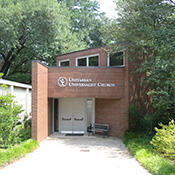 Unitarians—those who belief that God is a single entity—and Universalists—those who affirm that God’s love and salvation extends to everyone—have existed since the life of Jesus. In 1961, after centuries of persecution, the two strains of thought united under the banner of Unitarian Universalism. This theologically liberal and socially progressive religion welcomes the influence of many spiritual traditions, values reason and compassion, and lacks a binding creed....
Unitarians—those who belief that God is a single entity—and Universalists—those who affirm that God’s love and salvation extends to everyone—have existed since the life of Jesus. In 1961, after centuries of persecution, the two strains of thought united under the banner of Unitarian Universalism. This theologically liberal and socially progressive religion welcomes the influence of many spiritual traditions, values reason and compassion, and lacks a binding creed....  The official symbol of Unitarian Universalism is a flaming chalice. Originally a sign of refuge for those escaping Nazi persecution, the symbol now holds meanings as varied as the thousands of U.U. congregations that light chalices at the beginning of their weekly services....
The official symbol of Unitarian Universalism is a flaming chalice. Originally a sign of refuge for those escaping Nazi persecution, the symbol now holds meanings as varied as the thousands of U.U. congregations that light chalices at the beginning of their weekly services.... 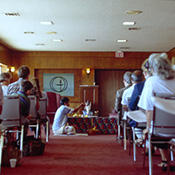 Unitarian Universalist communities include individuals with varied theological commitments, religious behaviors, and ritual observances. While Unitarian Universalists engage in many forms of religious practice and celebrate many religious and secular holidays, the springtime Flower Communion is a specifically Unitarian Universalist event that honors diversity within community....
Unitarian Universalist communities include individuals with varied theological commitments, religious behaviors, and ritual observances. While Unitarian Universalists engage in many forms of religious practice and celebrate many religious and secular holidays, the springtime Flower Communion is a specifically Unitarian Universalist event that honors diversity within community.... 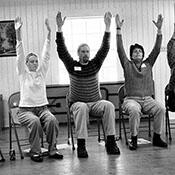 On Sunday mornings, Unitarian Universalist congregations come together to light a chalice, create music, hear sermons, and pray or meditate. Worship services are meant to help congregants explore what matters most in life. Outside of worship services, Unitarian Universalists participate in classes, often on topics such as sexuality and religious education, and spend time seeking individual and communal spiritual growth....
On Sunday mornings, Unitarian Universalist congregations come together to light a chalice, create music, hear sermons, and pray or meditate. Worship services are meant to help congregants explore what matters most in life. Outside of worship services, Unitarian Universalists participate in classes, often on topics such as sexuality and religious education, and spend time seeking individual and communal spiritual growth.... 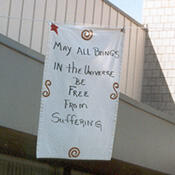 With a progressive legacy that includes the first American Christian ordination of women as ministers, Unitarian Universalism is continually committed to social justice. The tradition’s Seven Principles, which include recognizing “the worth and dignity of every person,” motivate many Unitarian Universalist congregations to organize in support of liberty, justice, and peace....
With a progressive legacy that includes the first American Christian ordination of women as ministers, Unitarian Universalism is continually committed to social justice. The tradition’s Seven Principles, which include recognizing “the worth and dignity of every person,” motivate many Unitarian Universalist congregations to organize in support of liberty, justice, and peace.... 